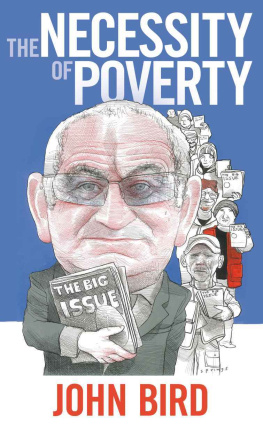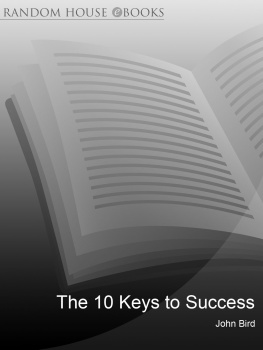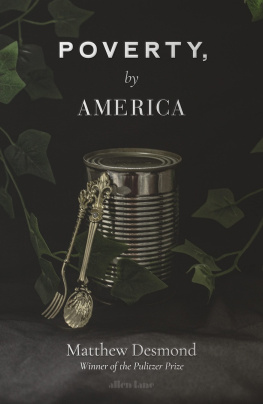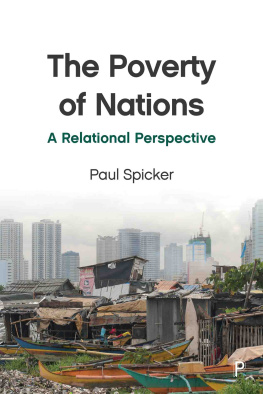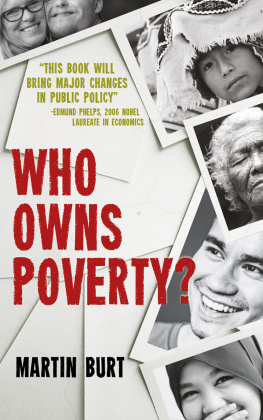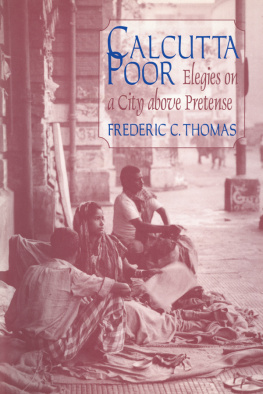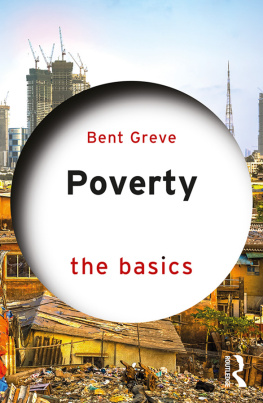THE NECESSITY OF POVERTY
JOHN BIRD

Published in 2012 by Quartet Books Limited
A member of the Namara Group
27 Goodge Street, London W1T 2LD
Copyright John Bird 2012
The right of John Bird to be identified
as the author of this work has been asserted
by him in accordance with the
Copyright, Designs and Patents Act, 1988
All rights reserved.
No part of this book may be reproduced in
any form or by any means without prior
written permission from the publisher
A catalogue record for this book
is available from the British Library
ISBN 978 0 7043 7306 8
Typeset by Josh Bryson
Contents
Lazy Underwear
One Sunday afternoon while walking along the boardwalk in Venice, California, I noticed ahead of me young girls and boys with their pants hanging down. You could see their underwear.
I was spending the afternoon with one of LAs most prominent homeless voices, an African-American advocate who had spent decades fighting for the right of the poor to live among the rich and to be allowed some prosperity.
I asked this man, What was it with the underwear?
Its simple. The young go and see their brothers in the prison. There, theyre wearing these denims that slip off their butts. Why? Because one size fits all are issued by the prison and they dont give you belts. So the young imitate their elders. At least thats how it started.
I was astonished. Many years before, I had been in a boys correctional facility and we had the same problem. But no fashion grew out of it.
Clothes, as well as music and attitude, seem so finely honed to imitate the poor of the world, especially inner city black culture, that a number of industries desperately need the poor to come up with the best tunes and the coolest fashion.
Poverty is necessary. If the poor did not live on the edge of things and out of it produce clothes, style and music you would not have modern pop culture. You would perhaps have a bland middle-class pop, but not one that sought to simulate the desperate words and music of inner city poverty.
The love affair that young middle-class white children have with their poor inner black counterparts has produced an enormous industry. It has enriched numerous people in the process: the record companies, producers, promoters and also many of the artists that have grown out of this. Poverty, a launch pad for many, has become the primary source of their prosperity.
On the day that Martin Luther Kings house was firebombed in Montgomery, Alabama, Elvis Presley went into the studio to record Blue Suede Shoes . The song put Presley on the road to fame and fortune. Up until that year, though, he was a regional singer with a limited appeal. Then he signed up for RCA, leaving Sam Philips Sun records, and the rest is history. From then on, the poor boy from Memphis, Tennessee, was on the way to becoming one of the biggest grossing artists of all time.
Presley was unique for a young performer from the American South. He did not limit himself to the white repertoire. He sang and imitated young black music and style from the start. He wore his hair and clothing the way young black men did in the streets and neighbourhoods around him. Presley soaked up the black experience and out of that made his name and reputation.
Presley came out of poverty and used the music of poverty. The mix of poor white and poor black helped to propel into existence an enormous industry that rolls on today.
Without poverty, without the ingrained oppression of the black experience in the Americas, one cannot imagine what culture would have replaced it. Imagine the world without the slave trade and the Middle Passage that brought black slavery to America. Imagine the world without the musical and cultural descendents of that experience.
I rest my case: much of the modern world would look totally different if we did not have poverty. We live this cultural need for poverty. Even the baby boomers would have been lost without that music to stimulate them. Imagine the Swinging Sixties without poverty, or without the music that came out of poverty.
The first time I heard the Rolling Stones, I was in a reformatory. One of the boys had been brought back for misbehaving and he had a record with him. It was a demo of Come On by the then unknown Rolling Stones. I listened to it and got to like it. When it was released, it did reasonably well. Those that followed did spectacularly well. Later, I heard the original by Chuck Berry and preferred it. But it was the Stones version that made the major musical change and helped build our modern pop culture.
Using the music of the poor, black South was the basis on which the largely middle-class Rolling Stones could become one of the biggest rock bands of all time. They sung black music and sold it back to the young whites of the States. Without the trials and tribulations of Americas poor we would not have had the Beatles, the Stones and countless other acts. There would be less fun without poverty to provide the grit and the story line, the passion and the outrage, that informed and empowered musicians without that experience.
The Necessity of Poverty is what I call this manifesto. I believe only by understanding how poverty is the backbone of our market-driven lives will we ever get to the bottom of dismantling it. We must understand how poverty provides for us and how without understanding its hold over us, we will never control and defeat poverty, let alone make a few dents in it.
Over the next pages, I hope to demonstrate that we can do something practical and useful about poverty. We can begin to dismantle its effects, but it will take an intellectual revolution in our thinking.
The Market Is Us
Much of the talk about poverty today is about the enormous gap between rich and poor. People are obsessed with this gap being an indicator of how screwed up the world is. But who creates this gap? Where does the gap appear from?
My father, though a hard-working building labourer, increased the gap between rich and poor virtually every day of his working life. He did this by buying the products of very rich men. For instance, the products created by Edward Guinness, first Earl of Iveagh.
When Lord Iveagh of the Guinness family died in 1923, he left the largest sum of any legacy in Britain. Lord Iveagh was what you might call a sliver capitalist. Sliver capitalism allows a modicum of money to be collected from every transaction. Much modern capitalism is about collecting together lots of pennies and cents.
Most of Iveaghs money came from getting people like my father to drink his beers, which my father did on as many occasions as his working life and finances afforded him. In many ways, Lord Iveagh received the lions share of my fathers weekly wages, with Dad spunking away on average about forty percent in various pubs around Londons then-slummy Notting Hill.
Lord Iveagh and the Guinness family got richer and out of the contributions from the likes of my father they went on holidays, bought racehorses, attended public schools and in an act of beneficence built houses for the working class. The gap between rich and poor increased inexorably, because people like my father bought the products of the one percenters of their generation.
My father and mother, not content to make money available for the Guinness familys racehorses and art collections, alighted on another beneficent giver to patronise. Aside from the Guinnesses, the other sliver capitalist that they had a lot of time for was the Bristol based business W.D & H.O. Wills, who made cigarettes and rolling tobacco. My parents had a constant supply of Wills products in the house and about their persons.

